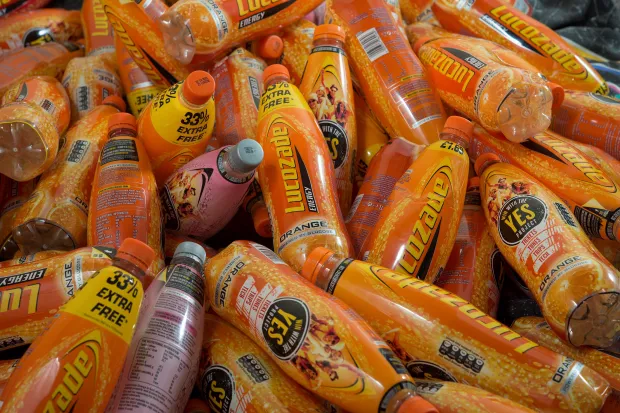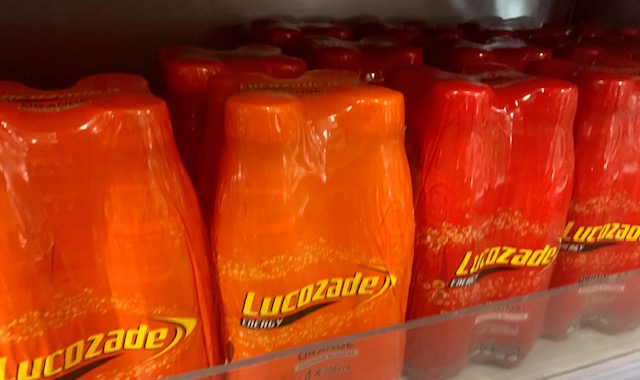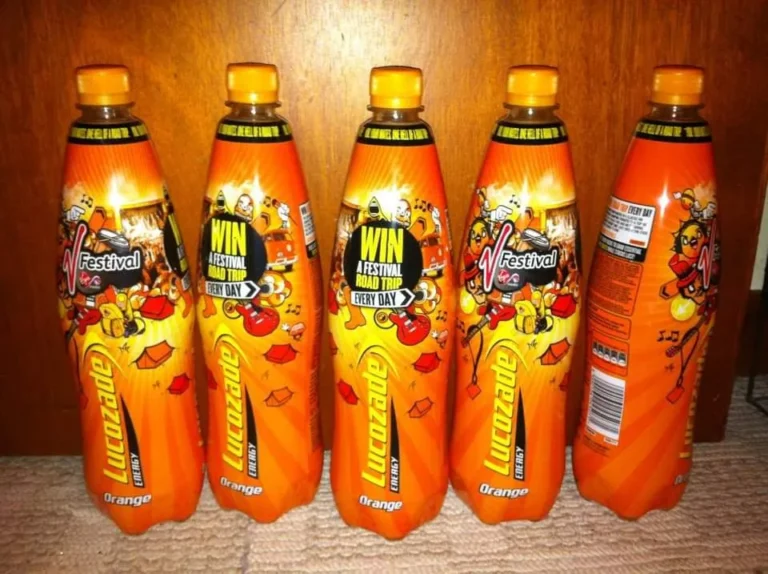Lucozade might not be the ideal choice for addressing diarrhea. While it does offer sugars and electrolytes that aid in hydration, the high sugar content could potentially worsen diarrhea symptoms in some cases. The excess sugar has the potential to draw more water into the intestines, possibly intensifying loose stools.
Additionally, it’s important to note that Lucozade is not specifically formulated as an anti-diarrheal solution. To effectively manage diarrhea, it’s crucial to prioritize water intake to prevent dehydration. If considering Lucozade, moderation is advised, and consulting with a healthcare professional is recommended.
What is Lucozade?

Lucozade is a popular beverage known for its energy-boosting properties. Originally developed as a hospital drink in the 1920s, it has evolved into a widely consumed energy drink.
The primary purpose of Lucozade is to provide a quick source of energy through its carbohydrate content, mainly in the form of sugars.
Marketed as a sports and energy drink, Lucozade is often consumed to combat fatigue, replenish energy levels, and enhance physical performance.
What are the Key Ingredients in Lucozade?
Carbohydrates: Lucozade contains various carbohydrates, including glucose and sucrose, which serve as the primary sources of energy. These sugars are rapidly absorbed, providing a quick energy boost.
Electrolytes: Essential minerals like sodium and potassium are present in Lucozade. These electrolytes help maintain proper fluid balance in the body and support hydration.
Vitamins: Lucozade often includes B-vitamins, such as B1, B3, B5, B6, and B12. These vitamins play a crucial role in energy metabolism and contribute to overall well-being.
Flavorings and Preservatives: Lucozade may contain artificial flavorings and preservatives to enhance taste and prolong shelf life. It’s important to be mindful of these additives, especially for those with sensitivities.
Can Lucozade Help with Diarrhea?
Lucozade’s composition includes electrolytes like sodium and potassium, essential for rehydration. During diarrhea, fluid loss is a concern, and these electrolytes help restore balance.
However, the effectiveness varies based on individual reactions. The sugars in Lucozade, while contributing to energy, may also draw water into the intestines, potentially exacerbating diarrhea symptoms.
Lucozade isn’t a direct anti-diarrheal remedy. It addresses hydration and energy needs rather than targeting the root causes of diarrhea. It’s essential to recognize that managing diarrhea involves a comprehensive approach, including dietary adjustments and, in some cases, medical guidance.
What Are the Benefits of Lucozade?
Hydration Support
Lucozade’s electrolytes aid in replenishing lost minerals during diarrhea, combating dehydration.
Quick absorption of electrolytes supports faster rehydration compared to plain water.
Energy Boost
The sugars in Lucozade provide a quick energy source, addressing fatigue associated with diarrhea.
Convenient and palatable, making it easier for individuals to consume during periods of reduced appetite.
Drawbacks of Lucozade
High Sugar Content
Excessive sugar intake may intensify diarrhea by drawing more water into the intestines.
Individuals with certain conditions like diabetes should be cautious due to the drink’s sugar content.
Not an Anti-Diarrheal Solution
Lucozade is not formulated to address the underlying causes of diarrhea but focuses on providing energy and hydration.
It may not be the most effective option for individuals seeking specific anti-diarrheal relief.
Individual Considerations
Individual tolerance to Lucozade during diarrhea can differ, with some experiencing relief and others heightened symptoms.
Individuals must observe their body’s response and make informed choices based on personal reactions.
Moderation is key, and consulting healthcare professionals is advisable, especially for those with pre-existing health conditions.
Alternative options like oral rehydration solutions or plain water may be recommended based on individual circumstances.
What are the Causes and Symptoms of Diarrhea?
Infections
Diarrhea resulting from infections is often triggered by bacteria, viruses, or parasites. Contaminated food or water is a common source.
Individuals may experience frequent loose stools, abdominal cramps, fever, and in some cases, vomiting. The severity depends on the causative agent.
Food Intolerance
Diarrhea due to food intolerance arises when the digestive system struggles to process certain substances, such as lactose or gluten.
Alongside diarrhea, individuals may encounter bloating, abdominal discomfort, and sometimes, nausea.
Medication Side Effects
Some medications, especially antibiotics, can disrupt the natural balance of gut flora, leading to diarrhea.
Diarrhea is a common side effect, and there may be alterations in regular bowel habits.
Inflammatory Bowel Diseases (IBD)
Chronic inflammation characterizes conditions like Crohn’s disease or ulcerative colitis, contributing to persistent diarrhea.
Diarrhea is accompanied by abdominal pain, fatigue, weight loss, and, during flare-ups, more severe symptoms.
Gastroenteritis
Infections from bacteria, viruses, or parasites can cause inflammation in the stomach and intestines.
Acute diarrhea is a hallmark, often accompanied by nausea, vomiting, abdominal cramps, and fever.
Malabsorption Disorders
Conditions like celiac disease hinder the body’s ability to absorb nutrients, leading to chronic diarrhea.
Persistent diarrhea, weight loss, nutritional deficiencies, and gastrointestinal discomfort are common.
Stress and Anxiety
Emotional factors, such as stress or anxiety, can influence the digestive system, leading to diarrhea.
Diarrhea during periods of heightened stress or anxiety.
Importance of Staying Hydrated During Diarrhea
Diarrhea results in the rapid loss of fluids from the body. Adequate hydration is crucial to compensate for this loss and maintain overall well-being.
Along with fluids, diarrhea leads to the depletion of essential electrolytes like sodium and potassium. Replenishing these minerals is vital for bodily functions.
Severe dehydration can have serious consequences, including weakness, dizziness, and, in extreme cases, organ failure. It is essential to address dehydration promptly.
Dehydrated individuals often experience an increased sense of thirst, signaling the body’s need for more fluids. Responding to this thirst is crucial for rehydration.
Concentrated and dark urine is a clear indicator of dehydration. Monitoring urine color can provide insights into hydration status.
Dehydration may exacerbate symptoms like nausea and vomiting, complicating the situation. Rehydration helps alleviate these symptoms.
Severe dehydration, especially in vulnerable populations like children and the elderly, requires prompt medical attention. Intravenous fluids may be necessary in extreme cases.
Consuming oral rehydration solutions or clear fluids with electrolytes is recommended to effectively replenish lost fluids and minerals. These solutions are designed to restore the balance of electrolytes in the body.
How does Lucozade contribute to hydration?

Electrolyte Replenishment
Lucozade contains electrolytes like sodium and potassium, essential for maintaining proper fluid balance in the body.
Electrolytes play a vital role in facilitating the absorption of water in the intestines, contributing to effective hydration.
Quick Absorption of Fluids
The sugars present in Lucozade contribute to a hypertonic solution, potentially enhancing the absorption of fluids in the small intestine.
This quick absorption can be beneficial, especially in situations where rapid hydration is necessary.
Energy Boost and Palatability
Lucozade’s carbohydrate content provides a quick energy source, making it appealing for individuals needing an energy boost.
The palatable nature of Lucozade may encourage individuals to consume more fluids, addressing the challenge of maintaining hydration levels.
Context of Consumption
Lucozade may be particularly useful in scenarios requiring both hydration and quick energy replenishment, such as post-exercise recovery or during periods of increased physical exertion.
How does it compare to other options?
Lucozade, with electrolytes and sugars, is a flavored option for quick hydration and energy. Compared to plain water, it offers a more appealing taste, but individuals should be mindful of its higher sugar content.
Lucozade vs. Plain Water
Lucozade
- Offers a more flavored and potentially palatable option compared to plain water.
- Contains electrolytes and sugars that may enhance hydration and energy replenishment.
Plain Water
- Essential for hydration without added sugars or flavors.
- May be less appealing to those who prefer flavored beverages.
Lucozade vs. Oral Rehydration Solutions (ORS)
Lucozade
- Provides electrolytes and sugars for hydration and energy.
- May not have the precise electrolyte composition tailored for specific dehydration conditions.
ORS
- Specifically formulated with an optimal balance of electrolytes and glucose for efficient rehydration.
- Often recommended for managing dehydration due to illnesses like diarrhea.
Lucozade vs. Coconut Water
Lucozade
- Contains electrolytes and sugars, offering a quick energy boost.
- May have a higher sugar content compared to coconut water.
Coconut Water
- Naturally rich in electrolytes with a lower sugar content.
- Provides hydration with a more subtle flavor profile.
Lucozade vs. Sports Drinks
Lucozade
- Designed for energy and electrolyte replenishment during physical activity.
- May have a higher carbohydrate content compared to some sports drinks.
Sports Drinks
- Tailored for rehydration during exercise, often with varying sugar and electrolyte concentrations.
- Choices depend on individual preferences and specific exercise needs.
FAQ
What should I drink if I have diarrhea?
When experiencing diarrhea, it’s recommended to drink clear fluids like water, herbal teas, or oral rehydration solutions. These options help prevent dehydration without the potential drawbacks of high sugar content found in some beverages.
Does Lucozade help with food poisoning?
Lucozade may provide hydration and energy, but it is not a specific remedy for food poisoning. It’s crucial to focus on rehydration with plain water or oral rehydration solutions and seek medical attention if symptoms persist.
What’s best to drink when sick and diarrhea?
When sick with diarrhea, opt for clear fluids such as water, herbal teas, or oral rehydration solutions to stay hydrated. These choices help replenish fluids without introducing potentially irritating substances.
What 12 foods stop diarrhea?
Foods that may help alleviate diarrhea include bananas, white rice, applesauce, and plain toast (BRAT diet). Additionally, yogurt with probiotics, boiled potatoes, and well-cooked carrots can be gentle on the digestive system.
How do you stop diarrhea fast?
To stop diarrhea quickly, focus on a bland diet, stay hydrated with clear fluids, and consider medications like loperamide under the guidance of a healthcare professional. Rest and avoiding irritants contribute to a faster recovery.
Is tea OK for diarrhea?
Tea, particularly herbal teas like chamomile or peppermint, can be soothing for individuals with diarrhea. However, caffeine-containing teas may need to be limited, and it’s essential to stay well-hydrated with other clear fluids.
What is the best tablet for loose motion?
The best tablet for loose motion depends on the underlying cause. Antidiarrheal medications like loperamide can be effective, but consulting a healthcare professional is crucial for proper diagnosis and guidance.
How long should diarrhea last?
The duration of diarrhea varies, but it usually resolves within a few days. If it persists for more than two days, seeking medical advice is important to identify the cause and ensure appropriate treatment.
Final thoughts
While Lucozade may provide quick energy and hydration, its high sugar content might not make it the best choice for managing diarrhea.
It’s important to consider alternative options like plain water or oral rehydration solutions and consult with a healthcare professional for personalized advice.

